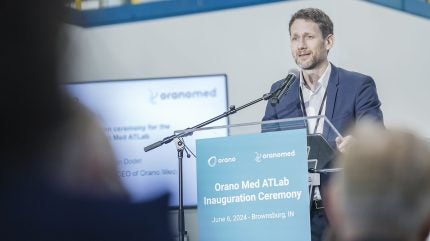
As the radiopharmaceuticals space continues to boom, it raises the challenges associated with the manufacturing and logistics of this class of drugs.
Orano Med, a clinical-stage biotech working on targeted alpha therapies for cancer, has opened its first Alpha Therapy Laboratory (ATLab) in Brownsburg near Indianapolis, Indiana.
Traditionally, radioligand therapy developers have utilised beta particles. However, Orano Med is conducting multiple clinical studies using drug candidates based on lead-212, a rare alpha-emitting radioisotope and one of the most potent therapeutic payloads against cancer cells.
Speaking with Pharmaceutical Technology, Orano Med’s CEO Julien Dodet said that radiopharmaceutical development is not straightforward. It requires sophisticated infrastructure and needs to be manufactured “just-in-time” to be delivered to patients. Quality control and numerous layers of regulation make this a daunting space for most companies to enter.
Dodet said the company realised early on that developing effective drugs alone wouldn’t be enough: “It was very clear to us that these drugs, if efficacious, would not be successful without the capacity to manufacture the drug,” he added.
Additionally, Dodet explained that this dual focus has made Orano Med unique because they control the entire supply chain. “I see more and more companies like Novartis investing in the capabilities to manufacture the drug, but they don’t have control of the supply chain. In particular, they’re not manufacturing the isotopes themselves.”
Access the most comprehensive Company Profiles on the market, powered by GlobalData. Save hours of research. Gain competitive edge.

Your download email will arrive shortly
We are confident about the unique quality of our Company Profiles. However, we want you to make the most beneficial decision for your business, so we offer a free sample that you can download by submitting the below form
By GlobalData
Dodet said that the main challenge is the short half-life of the isotopes. To support this, centralised facilities like the new one in Indianapolis, are set to produce lead-212 daily. This method offers more flexibility compared to other isotopes produced in reactors every few weeks.
“One of our goals is really to offer hospitals flexibility, if something goes wrong in transportation, we can offer and make a dose, which is not something you can do with lutetium [a beta-emitting isotope used in drugs to treat cancer],” said Dodet.
Orano Med has invested $20m into ATLab Indianapolis, which it says will cover 30,000 square feet of floor space and create 25 new jobs within the company. The facilities are expected to allow Orano Med to churn out 5000 radiopharma doses per year by 2025.
The radiopharmaceuticals space is gaining traction following a series of recent deals. Novartis is a major player in the field, having acquired Mariana Oncology in a $1.75bn transaction earlier this month. Novartis will acquire Mariana’s lead candidate MC-339, a radioligand therapy (RLT) designed to target small-cell lung cancer. In 2023, Mariana had raised $175m in a Series B round from Eli Lilly and other funds.
Orano Med is also planning to serve the European market, as construction of a similar site in Valenciennes, France has recently started.

Sign up for our daily news round-up!
Give your business an edge with our leading industry insights.
